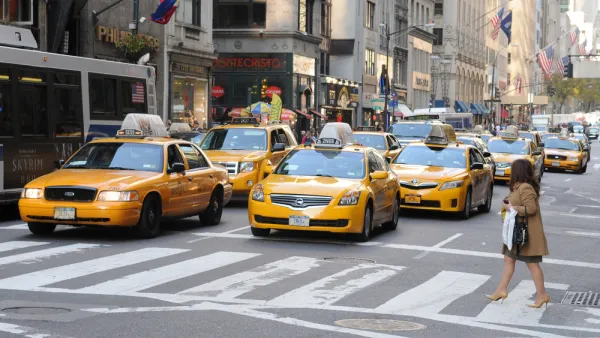One of the most-read stories in the urbanism world last week was a Wall Street Journal article about young people between the ages of 25 to 39 leaving the largest U.S. cities. Not so fast with all that, says Jose Cortright.

"It’s hard to underestimate the journalistic zeal to report a contrarian story. In the world of urbanism, a recent favorite has been 'young adults are leaving cities,'" writes Joe Cortright. "We’ve repeatedly debunked previous iterations of this particular species of weed, but unsurprisingly, it’s back."
The Wall Street Journal; first reported the Census data showing 27,000 people between the ages of 25 and 39 leaving big cities from 2017 and 2018. Crain's New York Business and, yes, Planetizen aggregated and shared that original story. We're not afraid to follow up that coverage with this criticism of the analysis presented in those articles, as written by Cortright:
“Tens of thousands” sounds pretty impressive number, unless you understand that there are more than 10 million 25 to 39 year olds living in cities with a population of 500,000 or more. (This basic contextual statistic is not included in the WSJ article.) So a decline of 27,000 represents a decrease on the order of one-quarter of one percent. That’s neither “large” nor “an exodus.”
According to Cortright, that kind of total is within the margin of error, and is more noise than signal. "Reporting a much smaller than margin of error change in a population subgroup as showing that young adults are leaving cities is the statistical equivalent of using a winter snowstorm as evidence that the global climate is not warming."
The article includes more criticism of the WSJ's methodology, as well as one example of a city—Portland, Oregon—showing evidence of increasing numbers of this key demographic.
FULL STORY: No youth exodus from cities: WSJ is detecting noise, not signal

Analysis: Cybertruck Fatality Rate Far Exceeds That of Ford Pinto
The Tesla Cybertruck was recalled seven times last year.

National Parks Layoffs Will Cause Communities to Lose Billions
Thousands of essential park workers were laid off this week, just before the busy spring break season.

Retro-silient?: America’s First “Eco-burb,” The Woodlands Turns 50
A master-planned community north of Houston offers lessons on green infrastructure and resilient design, but falls short of its founder’s lofty affordability and walkability goals.

Test News Post 1
This is a summary

Analysis: Cybertruck Fatality Rate Far Exceeds That of Ford Pinto
The Tesla Cybertruck was recalled seven times last year.

Test News Headline 46
Test for the image on the front page.
Urban Design for Planners 1: Software Tools
This six-course series explores essential urban design concepts using open source software and equips planners with the tools they need to participate fully in the urban design process.
Planning for Universal Design
Learn the tools for implementing Universal Design in planning regulations.
EMC Planning Group, Inc.
Planetizen
Planetizen
Mpact (formerly Rail~Volution)
Great Falls Development Authority, Inc.
HUDs Office of Policy Development and Research
NYU Wagner Graduate School of Public Service




























